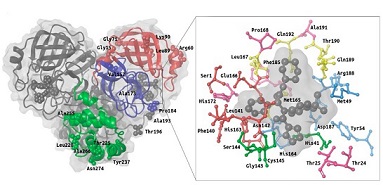WARNING! Mutations In New Emerging BA.2, BA.4 Subvariants Are Changing The Main Coronavirus Protease Drastically, Rendering Many Previous Antivirals Obsolete!
Source: Medical News - SARS-CoV-2 Antivirals Apr 27, 2022 2 years, 11 months, 4 weeks, 1 day, 8 minutes ago
Many are unaware that the SARS-CoV-2 coronavirus since the debut of the Omicron variant, has been evolving at a very high rate and spawning many new variants, subvariants and even third generation subvariants that not only have mutations on the Spike proteins but also on the Nucleocapsid proteins, and on other structural and non-structural proteins of the viral genome. In some cases, the number of mutations and the degree of divergence of some of these new variants such as the BA.4 variant and some of the new emerging BA.2 and BA.4 subvariants deserve to actually be accorded separate names and treated as a unique concerning variant by themselves and not be classed under the Omicron group.

Due to the rapid emergence of many of these new sub-variants that are now fast spreading and gaining predominance in circulation, many physicians are now finding that many antiviral drugs, repurposed drugs, supplements and even herbal based products and phytochemicals that exhibited efficacy in inhibiting the virus replication and curtailing viral loads are now no longer effective.
From approved drugs like remdesivir and paxlovid, to mutagenic pharmaceuticals like favipiravir and molnupiravir, supplements like quercetin, herbs like nigella sativa and its key phytochemical thymoquinone, other phytochemcials like EGCG (Epigallocatechin Gallate), glycyrrhizin, shikonin, curcumin, resveratrol, hesperidin, rutin, bacailin, etc,to even the grey drug ivermectin, all are now no longer able to inhibit the new SARS-CoV-2 BA.2 and BA.4 sub-variants. (Note: Fluvoxamine has no demonstrated antiviral effects on the SARS-CoV-2 virus and aids via anti-inflammatory mode but is known to cause arrythmia which can be fatal in people already infected with SARS-CoV-2 as their heart is already being affected by the virus in many other ways as well!)
Even Thailand
Medical News own newly formulated therapeutic teas are showing reduced efficacy against the new BA.2 and BA.4 subvariants and hence we are in the midst of developing a new line pending research of a few new identified phytochemicals with antiviral properties.
https://www.thailandmedical.news/news/new-therapeutic-teas-
One of the proteins responsible for the virus replication and maturation is the the main coronavirus protease also called the SARS-CoV-2 M
proor 3CL
pro.
M
pro, together with the papain-like protease PL
pro, are cysteine proteases (CPs) that process the polyproteins that are translated from the viral RNA in the replication of the SARS-CoV-2 virus. Thus, inhibiting activity of these enzymes would block the viral life cycle.
Many of the previous antivirals mentioned above focused on inhibiting these enzymes via a binding approach that will subsequently disrupt the replication process. For example, Paxlovid a combination drug with ritonavir as booster is an orally available Mpro inhibitor, employing a nitrile warhead to covalently bind the catalytic cysteine residue in the active site of the protease.
SARS-CoV-2 Mpro is a homodimeric cysteine protease, which processes the majority of the viral polyproteins pp1a and pp1ab encoded by the ORF1a/b gene. Inhibition of Mpro thus ultimately hinders the assembly of the replication and transcription complexes (RTCs). The
protease has a distinct recognition motif, with – in the Schechter-Berger notation – preference for leucine in P2 and especially strong preference for glutamine in P1.
Previous research on SARS-CoV-1 Mpro (which is 96% identical in amino acid sequence to SARS-CoV-2 Mpro) demonstrated that missense point mutations can influence protease activity.
https://pubmed.ncbi.nlm.nih.gov/32738988/
Mutants have been identified with slightly enhanced (Ser284, Thr285, Ile286) or slightly or severely reduced catalytic activity (Gly11, Asn28, Ser139, Phe140, Glu166, Asn214, Arg298). Specifically, the R298A mutation has become a tool to study the protease in its monomeric form, since it inactivates the protease by disrupting the Mpro dimer.
https://pubmed.ncbi.nlm.nih.gov/16478476/
https://pubmed.ncbi.nlm.nih.gov/25036652/
https://www.sciencedirect.com/science/article/pii/S0021925820714158
https://pubmed.ncbi.nlm.nih.gov/18305031/
However, the SARS-CoV-2 since the emergence of the main D614 mutation has been evolving and in the process many mutations have appeared on the various variants from the Alpha, Beta, Delta, Gamma, Lambda and Omicron variants that also affects the M
pro and PL
proproteases.
https://www.frontiersin.org/articles/10.3389/fcimb.2021.765039/full
These changes have affected the efficacy of certain antivirals.
https://www.scielo.br/j/babt/a/xJWXx4ShnGJsqcnNfrVT5Mb/?format=pdf&lang=en
In the case of the Omicron variant and the new ever emerging BA.2 and BA.4 subvariants, many missense mutations in the Mpro section of the ORF1a/b gene are being discovered.
All these new mutations are causing the Mpro section to react differently to the various past antiviral compound making them literally no longer effective.
Many of the pharmaceutical companies and drug experts are aware of this since the emergence of the Alpha variant but are still coming up with fraudulent research to insist that their products work! The same goes for many dietary nutraceutical companies peddling COVID-19 and Long COVID therapeutics that no longer work against the new BA.2 and BA.4 subvariants. (we cannot comment about the BA.5 variant as we do not have research or observational data of the effect of these antivirals against it.)
Thailand
Medical News urgently suggest that more research be conducted by independent and credible researchers on the missense mutations in the Mpro section of the ORF1a/b gene of these new BA.2 and BA.4 subvariants and also on the efficacy of many approved drugs, supplements and herbal nutraceutical that are being used as it is getting worrisome as the BA.2 and BA.4 subvariants start becoming the dominant variants in circulation in various geolocations around the world.
For more on
Antivirals and SARS-CoV-2 BA.2 and BA.4 subvariants, keep on logging to Thailand
Medical News.
